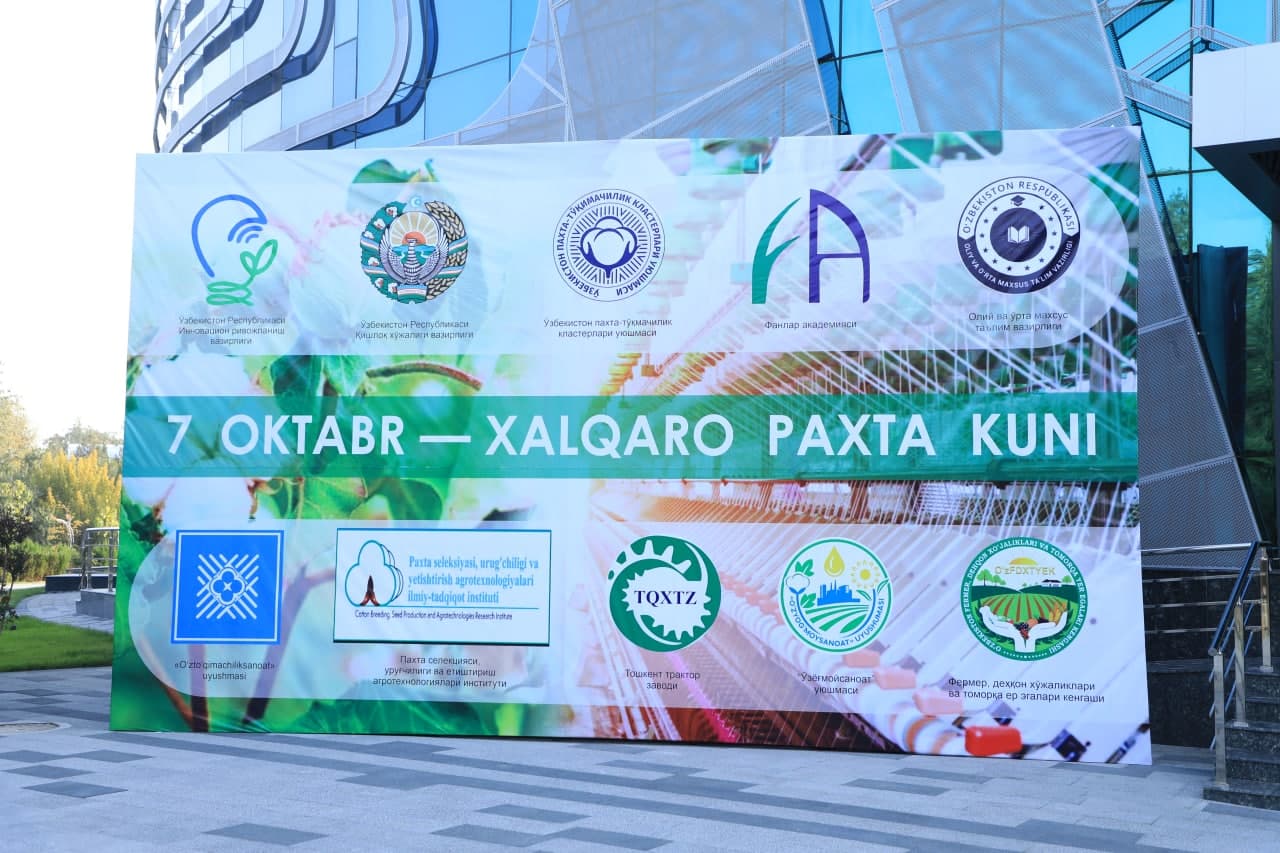Every year, October 7th is widely celebrated as the International Cotton Day. The activities held on this day are aimed at development of cotton production, cotton processing industry, support of researches and developments in the field, improvement of international cooperation in the field and determination of other practical measures.
On October 7, 2019, in cooperation with the secretariats of the World Trade Organization, the Food and Agriculture Organization of the United Nations (FAO), the United Nations Conference on Trade and Development (UNCTAD), the International Trade Center (ITC) and the International Cotton Council Committee (ICAC) announced the World Cotton Day for the first time.
The Ministry of Innovative Development of the Republic of Uzbekistan held events dedicated to the International Cotton Day on October 7 of this year. Exhibitions of cotton varieties, irrigation equipment, fertilizers and seeds, light and food industry products were organized in the exhibition hall of the Ministry. In the courtyard of the ministry, cotton production machinery, innovative techniques and technologies were demonstrated.
Also, within the framework of the event, a scientific-practical conference on "Innovative development of cotton: theory and practical principles" was held. The conference was opened by the Minister of Innovative Development Ibrahim Abdurahmanov and the Deputy Minister of Agriculture Alisher Torayev.
- We all know that growing cotton requires complex and hard work, deep knowledge and experience, love for the earth and, most importantly, great dedication from scientists, specialists, and agricultural workers in this field, - said I. Abdurakhmanov. - Today, extensive work is being carried out in cotton production: in 122 cotton production-textile clusters, in scientific centers and institutes of cotton production, work is being carried out to create new high-yielding varieties of cotton, in machine-building enterprises, techniques, equipment and equipment are being produced based on new innovative technologies for processing cotton. Today, the science of cotton growing in our republic is developing boldly in a smooth way. 11 innovative projects with a total value of 6.5 billion soums in the field of cotton farming financed by the Ministry of Innovative Development are being implemented. A number of projects are being studied today.
In addition, on the occasion of the International Cotton Day, a "Three-generation meeting" was held with the participation of industry honorees, young scientists, students and schoolchildren.
Cotton farming is an important sector of the national economy of Uzbekistan. More than 100 products are made from cotton raw materials, cotton leaves, stalks, pods and seeds, which means that this crop is completely used without waste. In particular, cotton cloths people, provides valuable raw materials for food products and industry, prepares animal feed, provides jobs for the population, foreign exchange earnings, and many other industries such as textiles, food, chemistry, automobile industry, aircraft industry, oil paint, paper. The development of manufacturing, medicine, construction, furniture industry and other industries is directly related to cotton growing. The history of cotton growing in Uzbekistan has a long history, and it is recorded in historical records that the peoples living in this region have been engaged in cotton growing since ancient times.
Its history dates back to the IV century BC. In the territory of our republic, the development of cotton growing on a large scale on an industrial basis began in the 60-70s of the 19th century. Currently, Uzbekistan occupies the sixth place among the countries of the world in cotton cultivation area (1.0-1.1 million hectares), fifth-sixth place in terms of cotton fiber production (0.8-0.9 million tons).
As the fame of Uzbek cotton is increasing in the world, the basis of this is the consistent reforms implemented in the development of the cotton industry in our country, the results of the work of scientists, industry officials and farmers.
